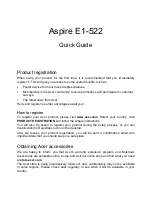
133
Mobile Computing
Disposing of used batteries safely
5.375 x 8.375 ver 2.4.1
❖
If you are not going to use the computer for more than
eight hours, disconnect the AC adaptor.
❖
Store spare battery packs in a cool dry place out of direct
sunlight.
Disposing of used batteries safely
You can recharge a battery many times. When the battery
needs replacing, the battery light flashes amber shortly after
you have fully recharged the battery
.
You must discard a battery if it becomes damaged.
CAUTION: The computer’s main battery is a Lithium Ion (Li-Ion)
battery, which can explode if not properly replaced, used, handled,
or disposed of. Putting spent batteries in the trash is not only
irresponsible, it may be illegal. Dispose of the battery as required
by local ordinances or regulations.
Use only batteries recommended by Toshiba.
The materials that came with your computer may include an
insert regarding the disposal of batteries. If not, check with
your local government agency for information on where to
recycle or dispose of old batteries.
Traveling tips
The environmental precautions listed in
, also apply while traveling.
❖
Never leave your computer on a sunny ledge or in a place
where it could get wet or covered in dust.
❖
Always travel with the computer in a carrying case.
Toshiba offers a choice of carrying cases for the
computer. They all provide plenty of extra space for
manuals, power cables, compact discs and diskettes.
















































